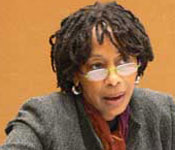Ilankai Tamil Sangam30th Year on the Web Association of Tamils of Sri Lanka in the USA |
|||
 Home Home Archives Archives |
Independent Expert on Minorities Presents Reports to Human Rights Councilby Human Rights Council, MORNING 16 March 2010
The Independent Expert on minority issues, Gay McDougall, this morning presented her reports to the Human Rights Council, which was followed by an interactive dialogue with her. The Council also concluded its general debate on the promotion and protection of all human rights, civil, political, economic, social and cultural rights, including the right to development. Ms. McDougall said that children must be at the forefront of the work of the minority issue mandate. Worldwide, minority children suffered disproportionally from unequal access to quality education. The situation of girls was of greatest concern as they were the most likely to be totally excluded from schooling. Disadvantaged minorities, even in developed countries, were far more likely to receive an inferior education than a good one; they were more likely to start school later rather than the prescribed age, if at all; and they were more prone to drop out from or fail to achieve in school. That perpetuated the cycle of poverty, leaving them unable to later fulfill their human potential, to gain meaningful employment, and to become respected members of society... KAREN PARKER, of International Educational Development, said International Educational Development welcomed the initiative of UN Secretary-General Ban Ki-Moon to look into war crimes in Sri Lanka in its final days. It praised Canada for highlighting the plight of Tamils and praised Hungary for setting up a school on mass atrocities and genocide. The Council must continue its consideration of the situation in Myanmar until there was a properly seated democratic Government in the country... MOHAN PEIRIS (Sri Lanka), speaking in a right of reply in response to the references made on the situation in Sri Lanka by some delegations with regard to the issue of investigations into addressing alleged human rights violations, said a domestic mechanism was expected to be established. This mechanism would be mandated to inquire and report on the underlying causes of the conflict. The body was also expected to examine the modalities of restitution to victims. It would also report on the measures taken to effect reconstruction and reconciliation. The Government was seriously regarding the Secretary-General’s proposal to appoint a Panel of Experts to advise him on accountability issues related to Sri Lanka. The presidential election had just concluded and the Parliamentary election was scheduled to be held on 8 April. In the medium to long-term they would continue to build institutional capacities that would accommodate an efficient and expeditious investigatory mechanism into matters pertaining to human rights. On journalists and freedom of expression, journalists had a free hand in Sri Lanka. Freedoms of opinion and expression were constitutionally guaranteed rights in the supreme law of the country. While freedom could be ensured, it was the responsibility of the media to maintain accuracy, fairness and objectivity... NICOLE RECKINGER (European Union) said the European Union acknowledged the continuous engagement of the Independent Expert to undertake country visits in order to promote the implementation of the United Nations Declaration on the Rights of Persons Belonging to Minorities, and welcomed the cooperation and constructive attitude of countries she had visited recently. However, the European Union was still very concerned that despite repeated requests, several States, among them Iran, Sri Lanka and China, had not responded to requests for visits. Could the Council help facilitate communications with these States, and how in general should it react to persistent patterns of non-cooperation, the European Union asked. Women belonging to minorities experienced unique challenges and multiple discrimination - how could these experiences be fed more systematically into the work of the Human Rights Council; could the Independent Expert please elaborate on how in future she envisaged the cooperation with the treaty bodies in the context of the Minority Forum, the European Union asked. |
||
|
|||
 Council Concludes General Debate on the Promotion and Protection of All Human Rights, Civil, Political,
Economic, Social and Cultural Rights, Including the Right to Development
Council Concludes General Debate on the Promotion and Protection of All Human Rights, Civil, Political,
Economic, Social and Cultural Rights, Including the Right to Development